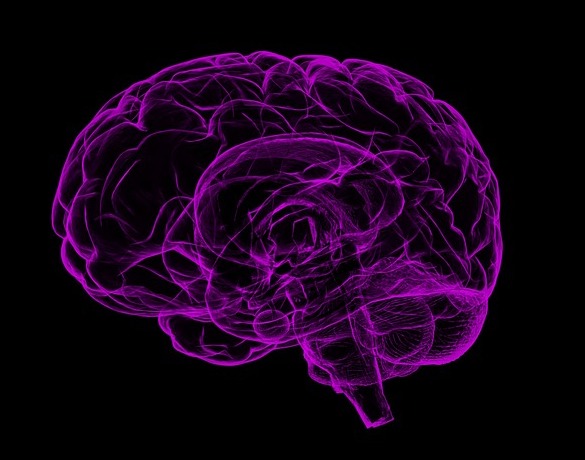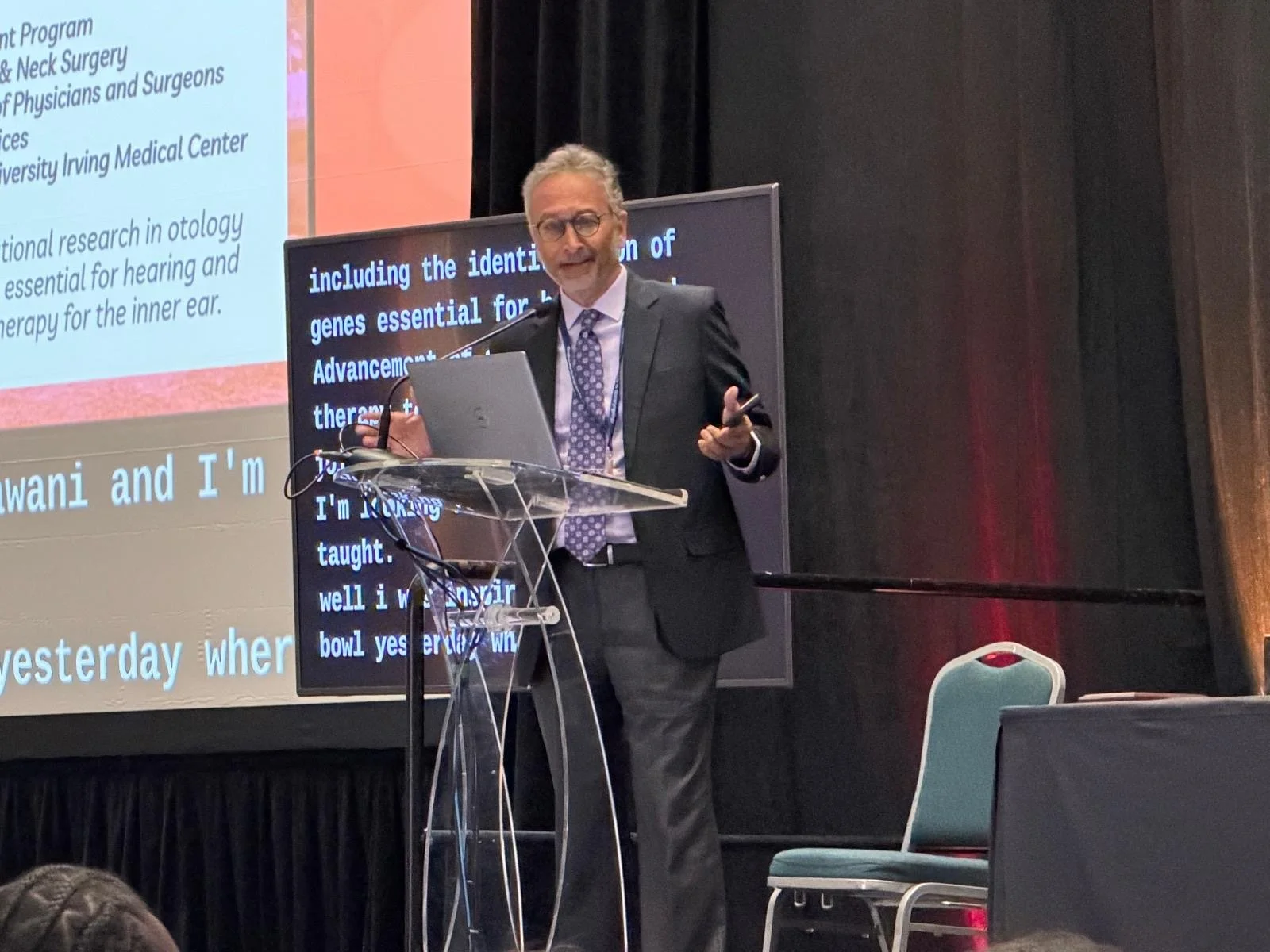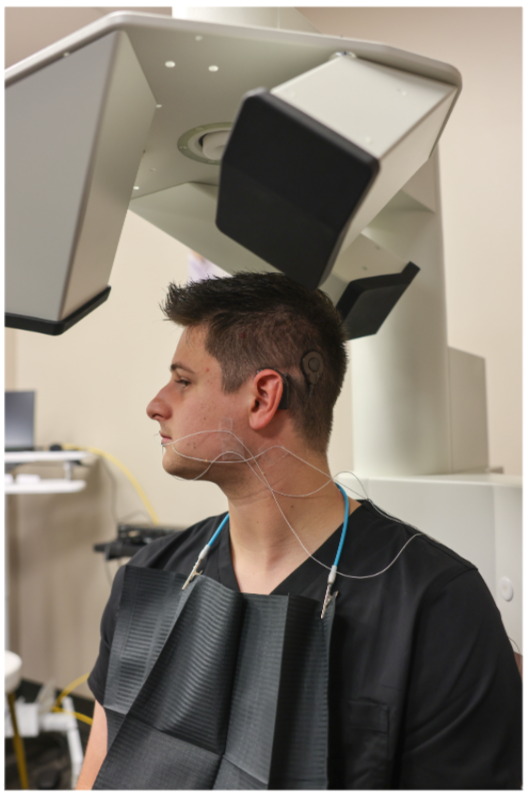(Desplácese hacia abajo para ver la traducción al español).
By Bill Hodgetts, Au.D., Ph.D.
When people think about hearing loss, they picture someone turning up the TV too loud or saying “what?” a lot. But what I’ve learned in more than 20 years as an audiologist is that hearing loss is rarely just about the ears.
It’s also about identity, emotion, and effort. And for many people, that’s the harder part.
As a clinician and university professor, I’ve worked with hundreds of people who hesitated to seek help—not because they couldn’t afford it, or didn’t have access to care, but because doing so meant admitting something they weren’t ready to accept: that something fundamental had changed.
They were afraid of what that change said about them. About aging. About control. About being “that person” with hearing aids.
I’ve come to believe that hearing loss is as much a psychological journey as a medical one. And maybe if more people understood that, they’d feel less alone and more willing to take the first step.
The Brain Works Harder
Hearing loss doesn’t flip a switch from “typical hearing” to “not hearing.” It’s slow, creeping. You start asking people to repeat themselves. You feel exhausted after social events. You laugh along with jokes you didn’t quite catch. You start withdrawing from the edges of conversations, and eventually from the conversations themselves.
What most people don’t realize is that hearing loss taxes your brain. Imagine trying to read a book in a dim room. You can do it, but it takes more concentration. That’s what listening is like for people with hearing loss, especially in noisy environments. The brain works overtime to fill in the blanks.
Over time, this constant strain leads to mental fatigue and reduced cognitive capacity for other things, like memory and decision-making.
It’s not just a guess—neuroimaging and longitudinal studies show it. In fact, large-scale research like the ACHIEVE study, a randomized controlled trial led by Johns Hopkins researchers, found that treating hearing loss in older adults at risk for cognitive decline reduced global cognitive deterioration by nearly 50 percent over three years.
The effect was strongest among participants with increased risk due to lower cognitive reserve and higher social vulnerability.
This isn’t because hearing loss causes dementia directly. Rather, the constant cognitive strain, combined with the social withdrawal that often accompanies hearing loss, creates conditions where the brain is less stimulated, less resilient, and more vulnerable over time.
The Role of Psychology
So if hearing loss affects the brain and well-being, why don’t more people get help? This is where psychology enters the room.
Humans are emotional decision-makers. We think we’re rational, but in reality, we rely heavily on feelings, assumptions, and mental shortcuts. In fact, behavioral research has shown that even trained clinicians can make inconsistent choices when emotions or personal beliefs come into play.
One of the strongest forces I see in the clinic is cognitive dissonance. That’s the uncomfortable feeling when our beliefs don’t match our actions. For example, someone might believe they’re independent and capable, but needing hearing aids makes them feel dependent or “old.” That internal conflict can lead to denial, resistance, and even anger.
Another common obstacle is self-efficacy—our belief in our ability to do something. I’ve met people who are successful in business or leadership but feel completely overwhelmed by the idea of managing hearing technology. Their fear isn’t the device—it’s failing at something unfamiliar.
Even the way people think about memory and aging can be distorted. If you forget a word in your 40s, you joke about being busy. If it happens in your 60s or 70s, you fear it’s a sign of decline. Add hearing loss to the mix, and that fear amplifies.
That’s why the stories we tell ourselves—and the ones society tells us—matter.
Being Truly Heard
The first audiology appointment isn’t just about a hearing test. It’s a conversation. We talk about how hearing loss is affecting your life: your relationships, your work, your confidence. We explore goals, concerns, and what matters most to you.
Sometimes, people expect to leave with a hearing aid and a fix. But managing hearing loss is a process, not a transaction. It takes time to adjust. Your brain has to relearn sounds it hasn’t heard clearly in a long time. That can be jarring, but also profoundly empowering.
This is why the relationship between clinician and client matters so much. Research consistently shows the most important factor in successful counseling—whether it’s for hearing or anything else—is trust. When people feel safe, valued, and understood, they’re more open to trying, adapting, and growing.
Not Weakness, But Wisdom
I often say that hearing aids are like umbrellas. They don’t stop the rain, but they help you stay dry. Similarly, hearing aids won’t reverse hearing loss or prevent aging. But they can reduce the strain of listening. They can help you stay socially connected. They can improve quality of life.
And as the ACHIEVE study reinforces, the cognitive benefits of intervention, especially those that are at a greater risk for cognitive decline, are not hypothetical. They’re real. When we help people hear better, we’re not just improving their social lives. We’re reducing their risk of accelerated brain decline.
Even if hearing aids didn’t offer cognitive protection, they’d still be worth it: for the joy of conversation, the ability to be present, and the chance to fully participate in life.
I know it can be hard to ask for help. But getting help doesn’t mean you’re broken. It means you value connection. It means you want to stay involved. It means you’re taking control.
So here’s what I hope people take away:
If you’re struggling to hear, get your hearing checked—even if it’s just to get a baseline.
If you’re offered treatment, give yourself time to adjust. It’s not about perfection, it’s about progress.
If you know someone who’s pulling away socially, talk to them. Hearing loss is invisible, but its effects are not.
And if you’re wearing hearing aids already, congratulations—you’re doing something incredibly proactive for your brain, your relationships, and your future.
As audiologists, we don’t just fix ears. We help people reconnect with their world. And that’s something worth hearing.
This article is republished from The Conversation under a Creative Commons license. Read the original article. Bill Hodgetts, Au.D., Ph.D., is a professor in the department of communication sciences and disorders at the University of Alberta, Canada. He holds a joint appointment at the Institute for Reconstructive Sciences in Medicine where he is program director for audiology and bone conduction amplification.
Por Qué Obtener Ayuda para la Pérdida Auditiva También Es un Viaje Psicológico
Por Bill Hodgetts, Au.D., Ph.D.
Cuando las personas piensan en la pérdida de audición, se imaginan a alguien subiendo demasiado el volumen del televisor o diciendo mucho "¿qué?". Pero lo que he aprendido en más de 20 años como audiólogo es que la pérdida auditiva rara vez se trata solo de los oídos.
También se trata de identidad, emoción y esfuerzo. Y para muchas personas, esa es la parte más difícil.
Como clínico y profesor universitario, he trabajado con cientos de personas que dudaban en buscar ayuda-no porque no pudieran permitírsela o no tuvieran acceso a la atención, sino porque hacerlo significaba admitir algo que no estaban listas para aceptar: que algo fundamental había cambiado.
Tenían miedo de lo que ese cambio dijera sobre ellos. Sobre el envejecimiento. Sobre el control. Sobre ser "esa persona" con audífonos.
He llegado a creer que la pérdida auditiva es tanto un viaje psicológico como médico. Y tal vez si más personas entendieran eso, se sentirían menos solas y más dispuestas a dar el primer paso.
El Cerebro Trabaja Más Duro
La pérdida auditiva no cambia un interruptor de "audición típica" a "no audición". Es lenta, progresiva. Ud. empieza a pedirle a la gente que repita lo que ha dicho. Se siente agotado después de los eventos sociales. Se ríe con chistes que no entendió del todo. Comienza a alejarse de los márgenes de las conversaciones y, finalmente, de las conversaciones mismas.
Lo que la mayoría de la gente no se da cuenta es que la pérdida de audición pone a prueba el cerebro. Imagínese tratando de leer un libro en una habitación oscura. Puede hacerlo, pero requiere más concentración. Así es escuchar para las personas con pérdida auditiva, especialmente en entornos ruidosos. El cerebro trabaja horas extra para llenar los espacios en blanco.
Con el tiempo, esta tensión constante conduce a la fatiga mental y a la reducción de la capacidad cognitiva para otras cosas, como la memoria y la toma de decisiones.
No es solo una suposición-las neuroimágenes y los estudios longitudinales lo demuestran. De hecho, investigaciones a gran escala como el estudio ACHIEVE, un ensayo controlado aleatorio dirigido por investigadores del Johns Hopkins, encontraron que el tratamiento de la pérdida auditiva en adultos mayores con riesgo de deterioro cognitivo redujo el deterioro cognitivo global en casi un 50 por ciento en tres años.
El efecto fue más fuerte entre los participantes con mayor riesgo, debido a una menor reserva cognitiva y una mayor vulnerabilidad social.
Esto no se debe a que la pérdida de audición cause demencia directamente. Más bien, la tensión cognitiva constante, combinada con el retraimiento social que a menudo acompaña a la pérdida de audición, crea condiciones en las que el cerebro está menos estimulado, menos resistente y más vulnerable con el tiempo.
El Papel de la Psicología
Entonces, si la pérdida auditiva afecta al cerebro y al bienestar, ¿por qué no hay más personas que busquen ayuda? Aquí es donde la psicología entra en escena.
Los seres humanos tomamos decisiones emocionales. Pensamos que somos racionales, pero en realidad, dependemos en gran medida de los sentimientos, las suposiciones y los atajos mentales. De hecho, la investigación conductual ha demostrado que incluso los médicos capacitados pueden tomar decisiones inconsistentes cuando las emociones o las creencias personales entran en juego.
Una de las fuerzas más acentuadas que veo en la clínica es la disonancia cognitiva. Esa es la sensación incómoda que surge cuando nuestras creencias no coinciden con nuestras acciones. Por ejemplo, alguien puede creer que es independiente y capaz, pero el necesitar audífonos lo hace sentir dependiente o "viejo". Ese conflicto interno puede llevar a la negación, la resistencia e incluso la ira.
Otro obstáculo común es la autoeficacia-la creencia en nuestra capacidad para hacer algo. He conocido a personas que tienen éxito en los negocios o en el liderazgo, pero se sienten completamente abrumadas por la idea de manejar la tecnología auditiva. Su miedo no es el dispositivo-es fallar en algo desconocido.
Incluso la forma en que las personas piensan sobre la memoria y el envejecimiento puede estar distorsionada. Si olvida una palabra a los 40 años, bromea acerca de estar ocupado. Si sucede a los 60 o 70 años, teme que sea un signo de declive. Si a esto le añadimos la pérdida de audición, el miedo se intensifica.
Es por eso que las historias que nos contamos a nosotros mismos, y las que la sociedad nos cuenta, son importantes.
Ser Verdaderamente Escuchado
La primera cita de audiología no se trata solo de una prueba de audición. Es una conversación. Hablamos de cómo la pérdida auditiva está afectando a su vida: sus relaciones, su trabajo, su confianza. Exploramos las metas, las preocupaciones y aquello que más le importa a Ud.
A veces las personas esperan irse con un audífono y una dosis. Pero gestionar la pérdida auditiva es un proceso, no una transacción. Se necesita tiempo para adaptarse. Su cerebro tiene que volver a aprender sonidos que no ha escuchado con claridad en mucho tiempo. Eso puede ser discordante, pero también profundamente empoderador.
Esta es la razón por la que la relación entre el clínico y el cliente es tan importante. Las investigaciones muestran consistentemente que el factor más importante para el éxito de la consejería-ya sea para la audición o cualquier otra cosa-es la confianza. Cuando las personas se sienten seguras, valoradas y comprendidas, están más abiertas a probar, adaptarse y crecer.
No Debilidad, Sino Sabiduría
A menudo digo que los audífonos son como paraguas. No detienen la lluvia, pero le ayudan a mantenerse seco. Del mismo modo, los audífonos no revertirán la pérdida auditiva ni prevendrán el envejecimiento. Pero pueden reducir la tensión de la escucha. Pueden ayudarle a mantenerse conectado socialmente. Pueden mejorar la calidad de vida.
Y como refuerza el estudio ACHIEVE, los beneficios cognitivos de la intervención, especialmente aquellos que tienen un mayor riesgo de deterioro cognitivo, no son hipotéticos. Son reales. Cuando ayudamos a las personas a oír mejor, no solo estamos mejorando su vida social. Estamos reduciendo su riesgo de deterioro cerebral acelerado.
Incluso si los audífonos no ofrecieran protección cognitiva, valdrían la pena: por el placer de la conversación, la capacidad de estar presente y la oportunidad de participar plenamente en la vida.
Sé que puede ser difícil pedir ayuda. Pero obtener ayuda no significa que Ud. esté quebrado. Significa que valora estar conectado. Significa que quiere seguir involucrado. Significa que está tomando el control.
Así que esto es lo que espero que la gente se lleve:
Si tiene dificultades para oír, hágase un chequeo, incluso si es solo para obtener una línea de base.
Si le ofrecen tratamiento, dese tiempo para adaptarse. No se trata de perfección, se trata de progreso.
Si conoce a alguien que se está distanciando socialmente, hable con él. La pérdida auditiva es invisible, pero sus efectos no lo son.
Y si ya está usando audífonos, felicitaciones: está haciendo algo increíblemente proactivo para su cerebro, sus relaciones y su futuro.
Como audiólogos, no nos limitamos a arreglar los oídos. Ayudamos a las personas a reconectarse con su mundo. Y eso es algo que vale la pena escuchar.
Este artículo es reproducido de The Conversation bajo una licencia Creative Commons. Lea el artículo original. Bill Hodgetts, Au.D., Ph.D., es profesor en el Departamento de Ciencias y Trastornos de la Comunicación de la Universidad de Alberta, Canadá. Tiene un cargo conjunto en el Instituto de Ciencias Reconstructivas en Medicina, donde es director del programa de audiología y amplificación de conducción ósea.
Traducción al español realizada por Julio Flores-Alberca, mayo 2025. Sepa más aquí.








Our new public service announcement “Let’s Listen Smart” recognizes that life is loud—and it’s also fun. And the last thing we want to do is stop having fun! We just need to listen responsibly.